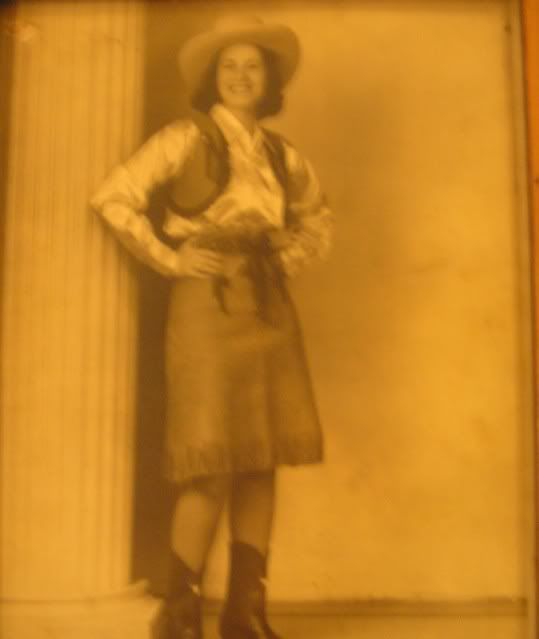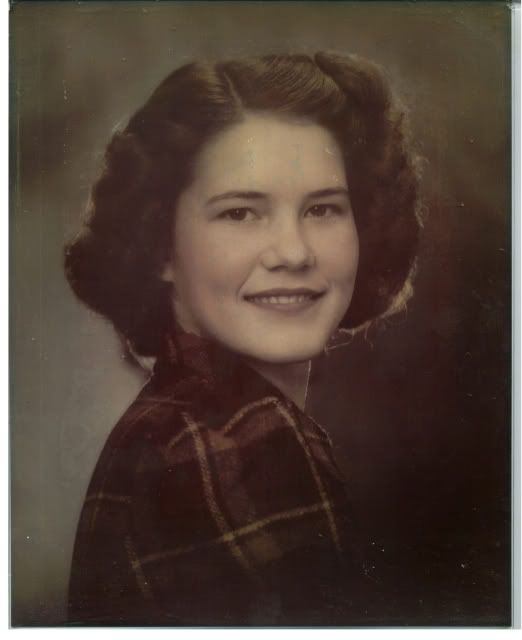(4 pm. – promoted by ek hornbeck)
Normally on Friday evenings I write about popular culture, but no tonight. I am very wistful for several reasons, on of which is that if she had lived, my mum would have turned 90 years old today.
Born to a dirt poor couple when her mum was only 18 years old (my grandmum and granddad married when my grandmum was only 16 years old), Geraldine Sandlin entered this vale of tears on 19211202. It was cold, and in accordance with the custom of the time, she was born at home with relatives taking the place of physicians.
She had no middle name. The Sandlins were sort of funny about that, because her father had no name at all (just “Boy”) until he actually named himself. I do not understand that tradition, and made up for it by giving all three of my boys TWO middle names. That is sort of cheating, because each of their second middle name was the family of their mum, but it technically there are two middle names.
In any event, she was a healthy girl and did not get any of the fatal, at the time, childhood infections that many people now foolishly choose not to immunize their children against. No diphtheria, no polio, no typhoid fever for her. Part of that was luck, and part of it was because my grandmum was meticulous in being clean, even under what we would now call primitive conditions.
She grew up, literally, in a “shotgun” house, with no running water, no heat except for a fireplace and the “cook stove”, and no electricity. She told me once that the scent of kerosene always took her back to her childhood, because that was the only light that they had after the sun sat, except for the fireplace.
Her parents were big on education. Neither of them had been graduated from high school, but both were literate (not exactly common at the time in rural western Arkansas). Ma, my grandmum, wrote very well and had fine penmanship, and I still have a few documents that were written by her own hand. Thus, they put her into school when the time came, in those days when she was six years old. My grandparents managed to scrape up enough money to take he to school either in the wagon, or later the car, because bus service was not known in that area in 1927.
There she met one Roy Willard Smith, my father. He told me that he knew that they would be married by the time that he was six years old, and sure enough he was right. They were inseparable during grade school, but she had serious relationship with another guy after she got a bit older, but my dad finally won her heart.
When she was almost eight years old, the economy crashed on Black Friday. Up to that time they were poor, but sort of making it. With the Great Depression, times got hard. My ancestors were hard workers, though, and they always were able to make the note on the farm and keep her in school. But life changed.
My grandfather, who died before I was born, was a laborer. There were no unions in that part of the country, so a man was worth only what back busting work that he could do. He mined some coal, but hardly was a miner. He did roughneck work for construction, but hardly was a professional in that area. When the mines and building projects dried up during the Depression, subsistence farming was all that was available.
They farmed the little piece of land that they owned, and fortunately it was what is called “bottom land”, meaning that it was alluvial soil deposited by floodwaters from one of the few year round creeks in the area, James Fork Creek. They grew all of their own food, pretty much, and had hogs, chickens, and a mild cow. Because of their work ethic, they were able to sell or trade excess food for other items, but mostly it was trade.
By 1932, things were really bad. Money was just about unavailable, but a few families had another resource, cotton. That was just about the only crop that could be grown in that climate that was worth money. Her family also had another valuable thing: a cotton allotment. An allotment (and they exist to this day) is the legal right to sell a farm product. Without an allotment, you could grow all of the cotton that you could, but you could not sell it. Cotton allotments were for a given number of acres, so weather was a real factor. In other words, you could only sell the cotton that was grown on “X” number of acres, so it paid only to plant that many. In good years, it brought in enough money to buy things like sugar, salt, coffee, pepper, cloth, and, at Christmas, a couple of bananas and oranges. My mum also remembered to me that the smell of an orange ALWAYS reminded her of Christmas.
Cotton is a hard crop to grow and harvest without modern machinery. They had a mule, a plow, hoes, and fingers. My granddad would plow the bottoms and Ma and my mum would follow and plant the seeds, using the hoes to pull the earth over them. Then for the rest of the season, they would “chop cotton”, a phrase that you might have heard before. That meant to take the hoes and chop out the weeds that tried to grow in the otherwise naked ground. I remember my mum telling me about doing that in the oppressively hot summers there, chopping slowly when the sun was bearing down on her, and chopping really fast when the occasional cumulus cloud gave her a bit of shade, to keep up with the shadow.
At that time, girls were covered almost head to toe with garments. A sun tan was considered to be unladylike then, so girls working in the fields were miserably hot! I will say that, even after she got older, she had very few wrinkles and lines on her face. Think of the pictures of Muslim women and that is what the girls at the time working in the fields resembled.
The worst part of growing cotton was picking it. Now it is done mechanically, but then it was manual. As cotton ripens, the bolls in which the fibre develops split into a fourfold opening, and the boll gets very hard. To pick the fibres, one has to insert a finger and thumb into the boll to extract all of the fibre. The bolls are essentially razors that cut and split cuticles into hamburger. Gloves were not an option, because hand picked cotton is done by feel. My mum told me that during picking time that her finger and thumb tips would just bleed and bleed, but she could not stop because if it happened to rain at harvest time, the entire crop, and thus the entire money supply for the year, would be lost.
That was in addition to school, hog killing, gardening, canning, taking care of the chickens and eggs, sewing, and everything else. But they did OK. By the time that 1937 turned around, times were getting a bit better there and my grandfather was able to get a paying job. They actually had a bit of disposable income, and had a photographic portrait of my mum taken. Here she is at the age of 16 years. I think that she was very, very beautiful. What say you?

She was still in school, and actually was graduated. She spent a couple of semesters at at the local business college, but never gained a higher degree. No matter, she was quite self educated. She was extremely intelligent, and curious about the world, and I think that is why I am as well.
She and my father married in 1941, and were hunting quail (in her younger days, she was deadly with a shotgun) when, on 19411207, only five days after her 20th birthday, they got the news about Pearl Harbor. That changed everything. The Depression was over for sure, then.
They were still on the farm at the time, but soon went to the northwest part of the country to build ships in Portland, Oregon. My father was 4-F because of a medical condition, so they, along with her parents moved there for the duration of the war. Dad was a welder and cutter, mum was an electric welder (she was the archtypical “Rosie the Riveter”), my granddad was an arc welder, and Ma was a demon with the cutting torch. She gave me advice years later, telling me that my father was too impatient when he used the cutting torch.
“David, ye has t’ heat the metal ’till it gets sorta orange beefore ye start acuttin’ it. If ye don’t, ye git rough edges. Take ye yur time!”
Well, after the war, the boom was on. My brother was born in Portland, in 1943 as I recall. I have written about him before, and will find a link for the next installment of this piece, because it is getting too long, for My Little Town next Wednesday.
Fast forward to 1957 on so. My dad was a sales representative for Beech-Nut chewing gum, and northwest Arkansas was one of his territories. He called on a five and dime store in Bentonville, Arkansas and asked if he could set up a display for the gum. The owner was nice to him, but said that he did not have any space.
Dad asked him if he could put it in front of the cash register, and the owner allowed it, but only on the condition that Dad would come back weekly and service the display, because the owner wanted it to be full most of the time. Dad agreed, and to this day you can find gum (with more modern things like mints and such) right around the checkout at Wal-Mart. Yes, that five and dime owner was Sam Walton!
Here is a picture of my mum at about the time that she gave me the honor of giving me birth. I love her, even though she is gone. I owe my life to her, and to Dad as well, but the mums do ALL of the heavy lifting!

I think that I shall keep Part II of this for a year from now. What say you?
Warmest regards,
Doc, aka Dr. David W. Smith
Crossposted at
Daily Kos, and

2 comments
Author
the best mum who ever lived?
Warmest regards,
Doc
Very lovable mum!!!cargo to australia